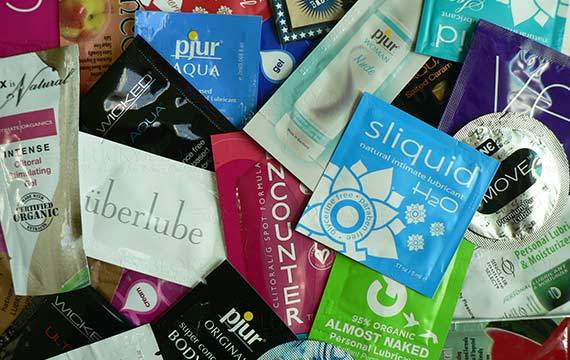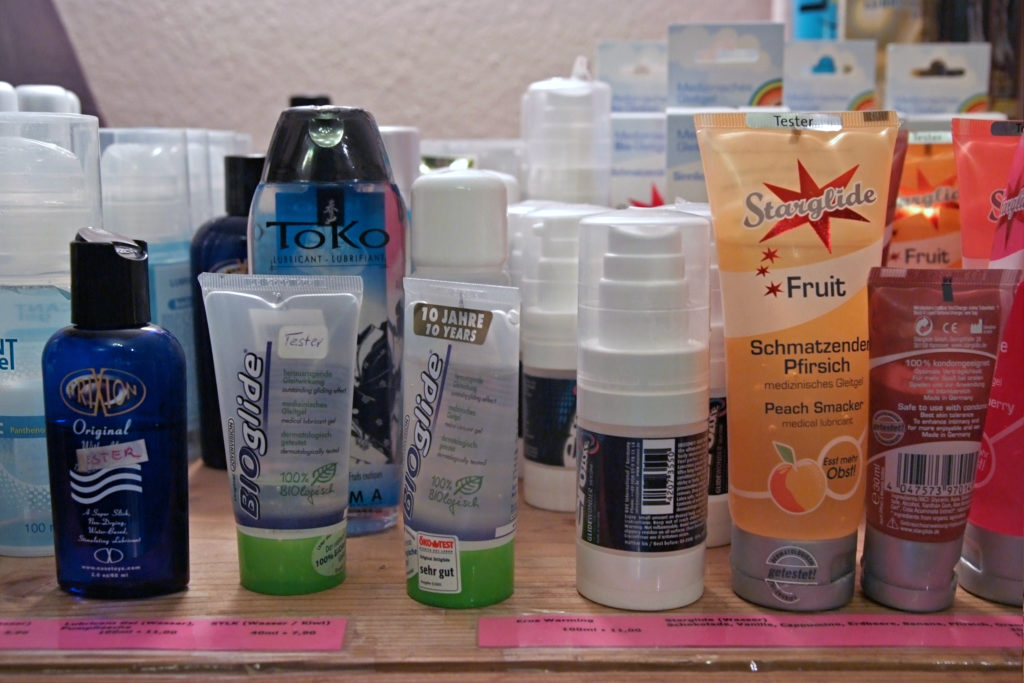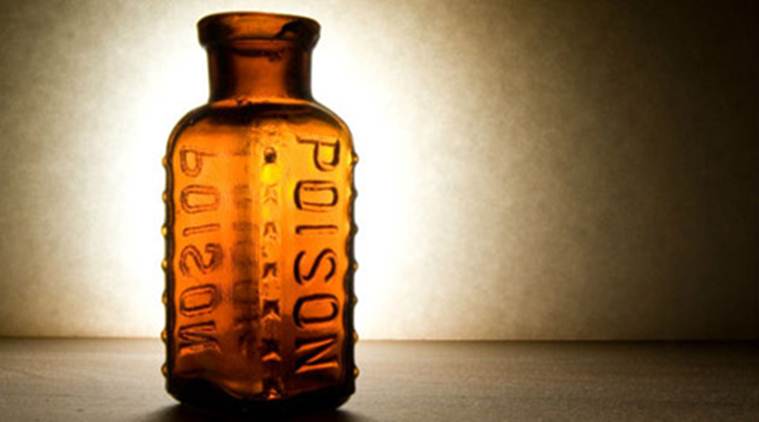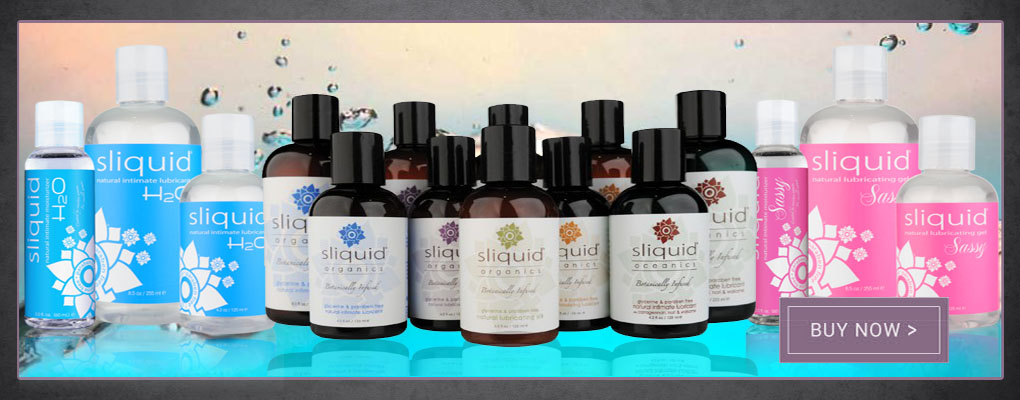
Body Safe Lubricants

Are All Personal Lubricants Safe?
You may be surprised to learn that not all personal lubricants used for sexual pleasure are created equally. You would think that products that come in intimate contact with our bodies would be all safe to use, but unfortunately that is not always the case. In fact, lubricants, like sex toys, are not regulated so lube companies can and do put whatever they want in their formulas. Most of the time, these ingredients are to enhance the product, but often they are chemicals and other ingredients that can irritate the delicate membrane tissues of the vagina or anus.
Types of Sexual Lubricants

Water Based Lubricants
Water based lubricants are the widest selection of sexual lubes. They are usually the best choice for female-centric bodies and vaginas. However, some water-based lubes contain parabens which can irritate the delicate tissues of the vagina, sugars or glycerin’s which can cause yeast infections, oils and other harmful chemicals. Be sure to read the labels to find out what is in the lubricants you purchase and avoid the list of chemicals and ingredients listed below.
Oil Based Lubricants
Oil based lubricants are designed for male masturbation and do a perfect job for that. However, oil based lubes break down latex and damage condoms, dental dams, diaphragms, and cervical caps, thus reducing their effectiveness. Oils coat the vagina and anus which makes is hard for the vagina or anus to “flush” itself, leaving you open to bacterial or other infections. It can take the vagina 3-5 days to break down and get rid of oils, so oil-based lubes should not be used for vaginal or anal sex and are only recommended as male masturbatory aids. This goes for other types of oils like vegetable oils, massage oils, Vaseline, WD-40, and Crisco. These oils can cause serious irritation, clog pores, don’t allow the skin to breathe, are not condom safe and should never go anywhere near the vagina.
Silicone Lubricants
Silicone lubes are condom safe and don’t dry up like water based lubricants, staying slick for a long time, making them ideal for sexual penetration. Because silicone lubes are not water based, they don’t wash away in water, making them great for sex in the shower. Silicone lubes coat the skin and don’t absorb into the body, so can leave a slick, oily feeling residue that some people don’t like. Because they are no water soluble, the can also stain your sheets.
Hybrid Lubes
Hybrid lubricants are a combination of both water-based and silicone-based lubricants, so have the best qualities of each. They are slipperier than water-based and last longer, but also won’t harm silicone toys. However, you should always do a patch test just to be sure.
Natural and Organic Lubricants
Natural and organic lubricants are mainly the safest type of lubricants you can buy, simply because they have less ingredients and don’t contain chemicals. However, many companies make the claim of a products being organic and natural, but that doesn’t mean it is still body-safe. Many parabens are derived from natural sources like blueberries and grapefruit seed (see parabens below), but are known irritants to the skin. Poison Ivy is also both natural and organic but I wouldn’t recommend it as a personal lubricant. So even if a product is made of natural ingredients, it may not be body-safe. Read the labels and keep your vagina, anus, penis and oral parts happy. Some natural and organic lubricants we love include Aloe Cadabra, Sliquid Organics, and Good Clean Love. Make sure to also look for lubes that are hypoallergenic if you have sensitive skin.
Flavored Lubricants
Flavored lubes are perfect for fellatio and can aid in a more enjoyable blow job for the partner giving head. However, many flavored lubes have sugars or glycerins so should be avoided in the vagina. Glycerine (a close relation to glucose or sugar, also called Glycerine or Glycerol) is used as a sweetener and preservative in cosmetics and has been linked to yeast infections in women who are prone to them. If more than 5% of glycerine is in a product it can also damage mucus membranes.
Sensation Lubes
Sensation Lubes often contain menthol or peppermint to add tingling or cooling sensation to the genitals during sex. These ingredients can be irritating to the vulva, vagina, penis and anus. Some stimulating lubes and creams for women also contain L-arginine which can make people with Herpes have worse break outs.

Anal Lubricants
Some anal lubricants contain numbing ingredients like Benzocaine, which is a local anesthetic commonly used as a topical pain reliever in anesthetic ointments such as oral gels for teething babies. Benzocaine is also used as a numbing agent in anal lubes like Anal-Eze, oral desensitizing creams like Good Head Oral Gel, a pleasure prolonging condoms like Trojan Extended Pleasure. Numbing agents are potentially dangerous when used anally as you may not feel pain which could result in serious injury from vigorous thrusting that could tear or damage mucus membranes or cause bruising. Additionally, over-application of oral anesthetics can increase the risk of pulmonary aspiration by relaxing the gag-reflex and allowing regurgitated stomach contents, oral secretions (or sperm!) to enter the airway. Benzocaine also is a well-known cause of methemoglobinemia, a condition in which the red blood cells cannot bind oxygen, causing shortness of breath, cyanosis, mental status changes, headache, fatigue, exercise intolerance, dizziness and loss of consciousness. Because it may be used in topical creams with a concentration as much as 20%, it is not difficult to administer a dose sufficient to cause this problem. Severe methemoglobinemia can cause dysrhythmias, seizures, coma and death. It is recommended not to use anal lubricants or oral desensitizing gels or sprays for these reasons.
Beware of Nonoxynol 9 (N-9)
Nonoxynol 9 (N-9) is a spermicide that is sometimes added to condoms and even lubricants. It was used to kill sperm, but also to reduce the chance of getting infected by an STI or HIV. However, studies conducted by the CDC (Centers for Disease Control) and WHO (World Health Organization) showed that N-9 can cause tissue irritation and small lesions, making it easier for a virus such as HIV or STIs to invade the body. So, N-9 does not protect against HIV infection, it may in fact increase the chance of getting infected.
Harmful Chemicals and Body Burden
Sixty percent of all chemicals we put on our skin ends up in the blood stream and lubricants may be absorbed through the mucus membranes of the vagina and anus even more so because there is no barrier for protection. Many personal lubricants and sensual products contain hazardous chemicals that create chemical body burden which is responsible for numerous health ailments. You can find out more about toxic chemicals in cosmetics and personal products in the Cosmetics Database and the Campaign for Safe Cosmetics.

- Parabens– Parabens (including Methylparabens and Propylparabens) are a group of chemicals used as preservatives in the cosmetics and are used for their bacteriocidal and fungicidal properties. Studies have found that parabens can be absorbed through the skin and can mimic the hormone estrogen, which has been linked to breast cancer. Parabens have also been known to decrease the sperm cell count in men, and promote allergic reactions on the skin such as burning and itching. Grapefruit seed extract (although natural, also called Citrus seed extract and Citrus grandis) is a paraben and should be avoided as it has known to be an eye irritant in low concentrations.
- DEA– Diethanolamine is a chemical wetting agent in cosmetics that helps keep a creamy consistency in lotions and creams. DEA can react with other ingredients in cosmetic formulations to form carcinogens that are readily absorbed through the skin and has been linked with stomach, esophagus, liver and bladder cancers.
- Glycerine– Glycerine (a close relation to glucose or sugar, also called Glycerine or Glycerol) is used as a sweetener and preservative in cosmetics and has been linked to yeast infections in women who are prone to them if more than 5% and more than that can damage mucus membranes.
- Menthol– Synthetic menthol as well as natural Peppermint Oil can be irritating and drying to a woman’s genitals and damages mucus membranes.
- Petrochemicals– Petrochemicals in oil-based products such as Mineral Oil (Liquidum Paraffinum), Petrolatum (petroleum jelly), Paraffin oil (lamp oil or premium Kerosine) or Paraffin wax, coat the skin halting its normal functions and are linked to cancer or other significant health problems. Petrochemicals have been restricted in cosmetic manufacturing.
- Propylene Glycol– Found in brake fluid, anti-freeze, paint solvents, and polyester compounds, Propylene Glycol is used as a solvent in many pharmaceuticals, and is used as a humectant food additive, emulsification agent, and moisturizer in cosmetics. The oral toxicity of propylene glycol is low, but large quantities can cause perceptible health damage in humans. Some people may obtain irritation from it including women with yeast infections and may cause intense burning and is an irritant to the eyes and skin.
- Polyethylene Glycol (PEG) – PEG is used as a thickener and is the basis of many skin creams, as cetomacrogol, and sexual lubricants, frequently combined with glycerin. It strips the skin’s natural moisture, is an eye and skin irritant, a possible carcinogen and can produce severe acidosis, central nervous system damage and congestion.
- L-Arginine– Is an amino acid and plays an important role in the healing of wounds, immune function, and the release of hormones. Like the drug sildenafil citrate (Viagra), L-arginine is thought to enhance the action of nitric oxide, which relaxes muscles surrounding blood vessels (vasodilation) supplying the penis. As a result, blood vessels in the penis dilate, increasing blood flow, which helps maintain an erection. The difference in how they work is that Viagra blocks an enzyme called PDE5 which destroys nitric oxide and L-arginine is used to make nitric oxide. People with genital herpes should not take L-arginine because it may aggravate their symptoms. –http://altmedicine.about.com/cs/herbsvitaminsad/a/Arginine.htm
- Aluminum Sulphate– Aluminum Sulphate (also known as Alum) is an inorganic salt used in “tightening” products such as shrink creams and antiperspirants, as well as food pickling and baking powder. This compound has an astringent property which causes the vaginal tissues to dehydrate and swell, and may be an irritant. Adverse effects of aluminum are currently known to be far more chronic (occurring over the long term) than acute (occurring in the short term) because it accumulates over time. Aluminum has been shown to be a neurotoxic compound if it is allowed to enter the bloodstream. Long-term exposure of patients may cause encephalopathy (defect of the brain) and/or bone mineralization disorders. Aluminum has also been suggested as a cause of Alzheimers disease, Lou Gehrig’s disease and other forms of senile dementia.
- Nonoxynol-9– Nonoxynol-9 is an abrasive detergent and was developed as a spermicide used in condoms, lubricants and sex toy cleaners. It was also shown to help kill the AIDs virus in clinical tests (in test tubes). However, it has been found to leave abrasions and lesions in the vaginal and to strip away the protective rectal lining in the anus, both of which could potentially increase chances of get AIDs, STDs and skin irritations.
- Benzocaine– Benzocaine is a local anesthetic commonly used as a topical pain reliever in anesthetic ointments such as oral gels for teething babies. Benzocaine is also used as a numbing agent in anal lubes like Anal-Eze, oral desensitizing creams like Good Head Oral Gel, a pleasure prolonging condoms like Trojan Extended Pleasure. Numbing agents are potentially dangerous when used anally or orally as you may not feel pain which could result in serious injury from vigorous thrusting that could tear or damage mucus membranes or cause bruising. Additionally, over-application of oral anesthetics can increase the risk of pulmonary aspiration by relaxing the gag-reflex and allowing regurgitated stomach contents, oral secretions (or sperm!) to enter the airway. Benzocaine also is a well-known cause of methemoglobinemia, a condition inwhich the red blood cells cannot bind oxygen, causing shortness of breath, cyanosis, mental status changes, headache, fatigue, exercise intolerance, dizziness and loss of consciousness. Because it may be used in topical creams with a concentration as much as 20%, it is not difficult to administer a dose sufficient to cause this problem. Severe methemoglobinemia can cause dysrhythmias, seizures, coma and death.
- Oils– Oil based lubes break down latex and damage condoms, dental dams, diaphragms, and cervical caps, thus reducing their effectiveness. Oils coat the vagina and anus which makes is hard for the vagina or anus to “flush” itself, leaving you open to bacterial or other infections. It can take the vagina 3-5 days to break down and get rid of oils, so oil-based lubes should not be used for vaginal or anal sex and are only recommended as male masturbatory aids. This goes for other types of oils like vegetable oils, massage oils, Vaseline, WD-40, and Crisco. These oils can cause serious irritation, clog pores, don’t allow the skin to breathe, are not condom safe and should never go anywhere near the vagina.
The bottom line? When it comes to personal lubricants do your homework and choose ones that are body safe and don’t contain ingredients or chemicals that may be harmful to your body.

Resources & References:


Autolike International, Autoliker, Increase Likes, Auto Liker, Photo Auto Liker, auto liker, Photo Liker, Working Auto Liker, Status Liker, ZFN Liker, Status Auto Liker, autoliker, auto like, Autoliker, Auto Like, autolike, Autolike
Like!! Really appreciate you sharing this blog post.Really thank you! Keep writing.